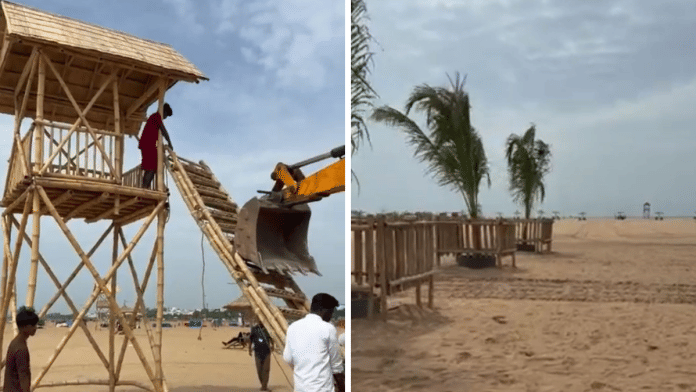Chennai: Four years after the Kovalam beach received the coveted Blue Flag certification for its high environmental standards, sustainable tourism and safety, the Tamil Nadu government has ramped up efforts to earn the tag for four other beaches in the state, including the famous Marina beach in Chennai.
Environment, Climate Change and Forests Department Additional Chief Secretary Supriya Sahu said essential Blue Flag amenities at the four beaches are being developed and are set to be completed in the next three months.
“Four beaches—Marina in Chennai, Ariyaman in Ramanathapuram district, Kameshwaram in Nagapattinam district, and the Silver beach in Cuddalore district have already had their Detailed Project Reports (DPRs) approved, and infrastructure development at these sites is at an advanced stage,” Sahu told ThePrint.
“Most of the essential Blue Flag amenities—such as eco-friendly sanitation blocks, safe swimming zones, and solid waste management systems —are being completed and are scheduled for completion in the next three months.”
The Blue Flag certification is a globally recognised eco-label awarded by the Denmark-based non-profit Foundation for Environmental Education (FEE) to beaches, marinas, and sustainable boating tourism operators that meet 33 criteria across four categories: environmental education and information, water quality, environmental management, and safety and services.
These criteria include maintaining clean bathing water, providing public safety measures, ensuring proper waste management, and promoting environmental education. Beaches with this certification are considered among the cleanest and most sustainable in the world, attracting eco-conscious tourists and aiding local economic growth.
Tamil Nadu’s push for earning the prestigious certification for the additional beaches will strengthen India’s position in global eco-tourism. Spain leads the chart currently with 729 certified sites.
The Tamil Nadu government has prioritised coastal development, with the Environment and Forest Department spearheading efforts to secure Blue Flag certification for beaches. This initiative builds on the success of Kovalam beach in Chengalpattu, which became Tamil Nadu’s first Blue Flag-certified beach in September 2021, recognised for its cleanliness, safety, and eco-friendly infrastructure.
Once the work at the four newly identified beaches is completed in three months, the state government would apply for the Blue Flag certification. According to the state government, an expert committee at the non-profit would review the application.
India currently has 13 Blue Flag-certified beaches, including the latest entrant Kovalam (Tamil Nadu), Eden (Puducherry), Shivrajpur (Gujarat), Ghoghla (Diu), Kasarkod and Padubidri (Karnataka), Kappad and Chal (Kerala), Rushikonda (Andhra Pradesh), Golden (also known as Puri beach, Odisha), Radhanagar (Andaman and Nicobar), and Minicoy Thundi and Kadmat (Lakshadweep).
Tamil Nadu’s Climate Change and Forest Department has also identified six additional beaches including the Neelankarai beach in Chengalpattu, Neithal Nagar beach in Nagapattinam, Marakkanam beach in Villupuram district and Kayalpattinam beach in Thoothukudi for the next phase of Blue Flag development.
“Baseline studies and community consultations are already underway, and DPRs (Detailed Project Reports) for the additional sites are expected to be finalised shortly,” Supriya Sahu told ThePrint.
Also Read: The curious India tourism paradox. Domestic pilgrims opt for luxury, foreigners go budget
The challenge ahead
Although the state government has been ambitious about getting its beaches Blue Flag certified, there are challenges on the ground, especially for a high-traffic urban beach like Marina.
Sahu said the Marina beach presents a unique challenge, primarily due to the scale of public use and the dynamic nature of its coastal environment. “However, the state government has made significant strides in systematically addressing the challenges through integrated planning, infrastructure upgrades, and stakeholder coordination under the TN-SHORE initiative,” Supriya Sahu said.
The Tamil Nadu Sustainably Harnessing Ocean Resources and Blue Economy or TN-SHORE (Neithal Meetchi Iyakkam) scheme is an initiative launched to restore coastal resources across the state’s 1,076-km coastline, focusing on enhancing coastal biodiversity, protecting marine ecosystems, controlling pollution and improving livelihoods for coastal communities.

Among the 33 Blue Flag criteria, a major area that required focussed resolution was the water quality compliance.
“This was largely because of the proximity of urban stormwater drains and variable sea conditions. Continuous monitoring and detailed assessments, supported by the National Centre for Sustainable Coastal Management (NCSCM), are underway. Structural solutions to address point (a single, identifiable source such as a pipe or factory discharge) and nonpint (from a dispersed area, like agricultural runoff or stormwater) source pollution are also being addressed in consultation with relevant departments,” Sahu noted.
Apart from making the beaches world-class, the state initiative also engages local communities through employment generation and environmental awareness.
“The Blue Flag beach sites are being developed as hubs for eco-tourism and green livelihoods, with structured engagement of coastal communities in waste management workforce, eco-tourism services,” Supriya Sahu said.
Through the TN-SHORE scheme, Surpiya Sahu said, the state government is promoting a sense of ownership and pride among coastal communities, positioning them not only as beneficiaries but as active custodians of Tamil Nadu’s sustainable beach development model.
The state government has partnered with the National Centre for Sustainable Coastal Management(NCSCM) and the World Bank for achieving the Blue Flag goals. It is also actively working to deepen and expand other partnerships, including with international blue flag agencies, civil society groups, universities and the private sector in ecotourism.
“These alliances will help scale the Blue Flag model across more beaches, integrate cutting-edge sustainability practices, and position Tamil Nadu as a national and global leader in responsible beach development,” Surpiya Sahu told ThePrint.
(Edited by Ajeet Tiwari)
Also Read: Children are Old Delhi’s newest tour guides. Tourists can’t get enough of them






